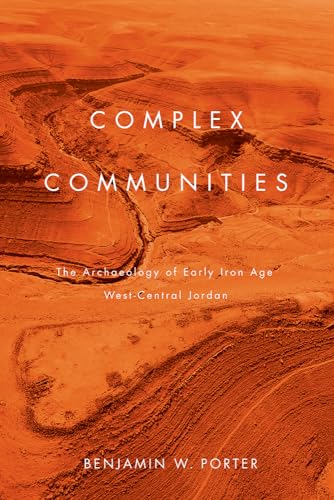Complex Communities: The Archaeology of Early Iron Age West-Central Jordan - Hardcover

Zu dieser ISBN ist aktuell kein Angebot verfügbar.
Alle Exemplare der Ausgabe mit dieser ISBN anzeigen:„Über diesen Titel“ kann sich auf eine andere Ausgabe dieses Titels beziehen.
- VerlagUniversity of Arizona Press
- Erscheinungsdatum2013
- ISBN 10 0816530327
- ISBN 13 9780816530328
- EinbandTapa dura
- Anzahl der Seiten208
Neu kaufen
Mehr zu diesem Angebot erfahren
Versand:
EUR 43,05
Von Vereinigtes Königreich nach USA
Beste Suchergebnisse bei AbeBooks
Complex Communities (Hardcover)
Buchbeschreibung Hardcover. Zustand: new. Hardcover. Complex Communities explores how sedentary settlements developed and flourished in the Middle East during the Early Iron Age nearly four thousand years ago. Using archaeological evidence, Benjamin Porter reconstructs how residents maintained their communities despite environmental uncertainties. Living in a semi-arid area in the present-day country of Jordan, villagers faced a harsh and unpredictable ecosystem. Communities fostered resilience by creating flexible production routines and leadership strategies. Settlements developed what archaeologists call communal complexity, a condition through which small-scale societies shift between egalitarian and hierarchical arrangements. Complex Communities provides detailed, scientifically grounded reconstructions of how this communal complexity functioned in the region. These settlements emerged during a period of recovery following the political and economic collapse of Bronze Age Mediterranean societies. Scholars have characterised west-central Jordans political organisation during this time as an incipient Moabite state. Complex Communities argues instead that the settlements were a collection of independent, self-organising entities. Each community constructed substantial villages with fortifications, practiced both agriculture and pastoralism, and built and stocked storage facilities. From these efforts to produce and store resources, especially food, wealth was generated and wealthier households gained power over their neighbours. However, power was limited by the fact that residents couldand didleave communities and establish new ones. Complex Communities reveals that these settlements moved through adaptive cycles as they adjusted to a changing socionatural system. These sustainability-seeking communities have lessons to offer not only the archaeologists studying similar struggles in other locales, but also to contemporary communities facing negative climate change. Readers interested in resilience studies, Near Eastern archaeology, historical ecology, and the archaeology of communities will welcome this volume. Explores how sedentary settlements developed and flourished in the Middle East during the Early Iron Age nearly four thousand years ago. Using archaeological evidence, Benjamin Porter reconstructs how residents maintained their communities despite environmental uncertainties. Shipping may be from our UK warehouse or from our Australian or US warehouses, depending on stock availability. Bestandsnummer des Verkäufers 9780816530328
Weitere Informationen zu diesem Verkäufer | Verkäufer kontaktieren

